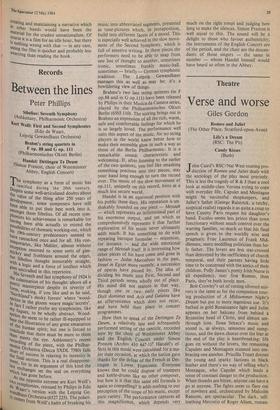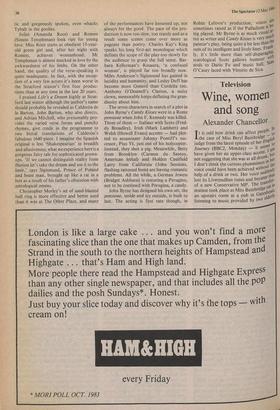Theatre
Verse and worse
Giles Gordon
Romeo and Juliet (The Other Place, Stratford-upon-Avon) Candy Kisses (Bush)
John Caird's RSC/Nat West touring pro- duction of Romeo and Juliet deals with the sociology of the play most precisely. This is less the tragedy of R & J than a cool look at middle-class Verona trying to cope with everyday life. Capulet and Montague might be successful shopkeepers, and Juliet's father (George Raistrick, a tetchy, sceptical realist) regards it as quite a coup to have County Paris request his daughter's hand. Escalus seems less prince than town functionary without much control over the warring families, so much so that his final speech is given to the worldly wise and pragmatic Friar Laurence of Frank Mid- dlemass, more meddling politician than ho- ly father. The lovers are less star-crossed than destroyed by the inefficiency of church temporal, and their parents having little time to be concerned with the antics of their children. Polly James's pretty Irish Nurse is all expediency, too: first Romeo, then Paris, they're both lovely men.
Bob Crowley's set of rotting silvered mir- rors is the same as for the companion tour- ing production of A Midsummer Night's Dream but put to more ingenious use. It's bathed in gold Renaissance light and Juliet appears on her balcony from behind a Byzantine head of Christ, and almost see- through icon. Ilona Sekacz's music and sound is, as always, sensuous and sump- tuous, and the dawn chorus over the bier at the end of the play is heartbreaking: life goes on without the lovers, the remaining Capulets and Montagues stunned into em- bracing one another. Priscilla Truett dresses the young and sparky factions in black leather and there's no way of telling who's Montague, who Capulet which lends a sense of constant danger to the production. When thumbs are bitten, anyone can have a go at anyone. The fights seem to flare out of nowhere and, orchestrated by Malcolm Ransom, are spectacular. The dark, self- loathing Mercutio of Roger Allam, roman-
tic and gorgeously spoken, even whacks Tybalt in the goolies.
Juliet (Amanda Root) and Romeo (Simon Templeman) look ripe for young love. Miss Root starts as obedient 13-year- old green girl and, after her night with Romeo, achieves womanhood. Mr Templeman is almost mocked in love by the awkwardness of his limbs. On the other hand, the quality of the verse-speaking is quite inadequate. In fact, with the excep- tion of a very few actors it's been worse in the Stratford season's first four produc- tions than at any time in the last 20 years.
I praised Life's a Dream highly at Strat- ford last winter although the author's name should probably be revealed as Calderon de la Barton. John Barton, who also directs, and Adrian Mitchell, who presumably pro- vides the varied verse forms and punchy rhymes, give credit in the programme to two literal translations of Calderon's fabulous 1640 piece. I imagine the Spanish original is less 'Shakespearian' in breadth and allusiveness; what we experience here is a gorgeous fairy tale for sophisticated grown- ups. 'If we cannot distinguish reality from illusion let's take the dream and use it to the limit,' says Sigismund, Prince of Poland and beast man, brought up like a rat in a box as a result of his father's obsession with astrological omens.
Christopher Morley's set of sand-blasted bull ring is more effective and better used than it was at The Other Place, and many of the performances have loosened up, not always for the good. The pace of the pro- duction is now too slow, too stately and as a result some scenes come over more as pageant than poetry. Charles Kay's King speaks his long first-act monologue which defines the scope of the play too slowly for the audience to grasp the full sense. Bar- bara Kellerman's Rosaura, 'a confused woman', is played far too broadly now. Miles Anderson's Sigismund has gained in lucidity and humanity, and Lesley Duff has become more Goncril than Cordelia too. Anthony O'Donnell's Clarion, a noisy clown, memorably keeps deflating the gran- diosity about him.
The seven characters in search of a plot in John Byrne's Candy Kisses were in a Rome pensione when John F. Kennedy was killed. Three of them — Italians with Scots (Fred- dy Broadley), Irish (Mark Lambert) and Welsh (Howell Evans) accents — had plot- ted to assassinate Johnny Pontiff's suc- cessor, Pius VI, just out of his holycopter. Instead, they shot a pig. Meanwhile, Betty from Brooklyn (Carmen du Sautoy, American lethal) and Holden Caulfield Larry from California (John Sessions, flashing tattooed bum) are having romantic problems. All the while, a German Jewess (Bridget Ashburn) is restoring a Perugino, not to be confused with Perugina, a candy.
John Byrne has designed his own set; the pensione, inside and icy outside, is built to last. The acting is first rate though, in Robin Lefevre's production, voices are sometimes raised as if the Palladium is be- ing played. Mr Byrne is as much visual ar- tist as writer and Candy Kisses is very much painter's play, being quite a bit less than the sum of its intelligent and lively lines. Frank' ly, it's little more than self-disparagwit"m,g,' scatological Scots gallows humour nods to Dario Fo and music hall, Sean O'Casey laced with Vittorio de Sica.







































 Previous page
Previous page